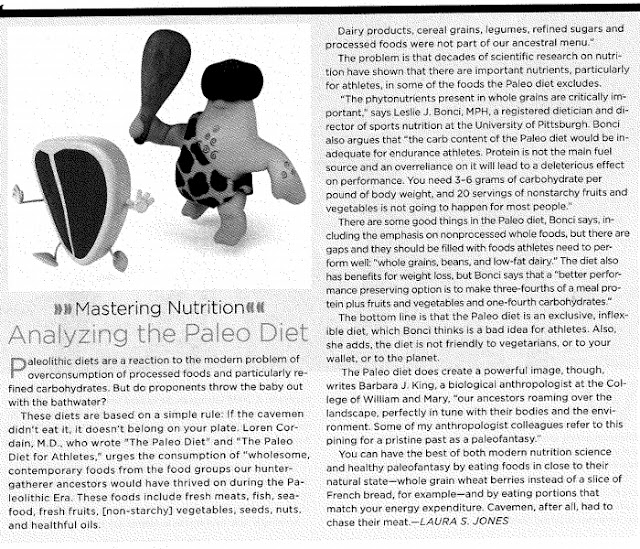Here's a flawed article published in the recent issue of Swimmer Magazine about the Paleo Diet:
And here's a letter I'm sending to Swimmer Magazine as a rebuttal:
Dear Editor,
As a science writer specializing in evolution and human well-being, I was pleased to see the appearance of “Mastering Nutrition: Analyzing the Paleo Diet” by Laura S. Jones in the recent issue of Swimmer Magazine. Evolution is the guiding principle of biology, the unifying theory of the life sciences, and it carries with it huge implications for human health that would be of value to your readers.
However, I was surprised to see a lack of due diligence on the part of the author of that piece, who ultimately took a critical position of the diet, even going so far as to mock its adherents as living in a “paleofantasy,” being unscientific, and even being unsympathetic to social and moral issues. I'd like to deconstruct some of the lies in this article.
The author writes, “The problem is that decades of scientific research on nutrition have shown that there are important nutrients, particularly for athletes, in some of the foods the Paleo Diet excludes.” She then goes on to mention “phytonutrients” and “carbohydrates” via advice by Leslie J. Bonci, MPH, a registered dietitian and director of sports nutrition at the University of Pittsburgh.
The truth is that phytonutrients are a controversial source of nutrition. There is no evidence that they decrease mortality or cardiovascular disease (1), and there is no evidence that they augment athletic performance – why would the Los Angeles Lakers take up a grain-free, whole foods diet if they needed more phytonutrients? The second truth is that paleo-friendly vegetables, nuts, seeds, and fruits contain plenty of phytonutrients, and generally more so than whole grains.
If you google “phytonutrients in whole grains” the top result is the Linus Pauling Institute, Micronutrient Research for Optimum Health. Their Information Center states that grains are high in lignans and phytosterols (1a), so let's look at these.
That same #1 Google result links to a page on Phytosterols, saying “Early human diets were rich in phytosterols, providing as much as 1 g/d; however, the typical Western diet today is relatively low in phytosterols” (1b). This clearly contradicts the idea that whole grains increase phytosterol intake, since “early humans” did not eat whole grains! Additionally, the same page shows macadamia nuts, brussel sprouts, and almonds as delivering plenty of phytosterols, all of which are paleo-friendly.
Out of the top five food sources of lignans, the top three are paleo, and four of the top five are paleo (2). It's obvious, even at an elementary level of internet literacy, that the entire basis of Jones' and Bonci's argument on phytonutrients contains failed logic and irresponsible journalism.
As does their argument about carbohydrates. After mentioning that Cordain has written a book special to athletes, they neglect to mention that it recommends plenty of carbohydrates matched to the athlete's level of exertion (3). The truth is that there are plenty of carbohydrates in fruits, starchy vegetables, and tubers, all of which early humans and modern hunter-gatherers consumed (4). Why would Usain Bolt prefer paleo-friendly yams if they didn't provide him with enough carbs?
For such a short article, Jones doesn't stop there. She writes that a paleo diet is “not friendly to vegetarians, or to your wallet, or to the planet,” characterizing paleo diet adherents as unsympathetic to animal rights activists and social issues, and unable to perform cost/benefit analysis. All of this is wrong.
Many animal rights activists choose paleolithic eating strategies, some of whom are still completely vegetarian. Personally, I generally eat one vegetarian meal per day. Also, supporting local sustainable farms, which nearly all Paleo experts vocally recommend and many Paleo diet adherents are passionate about, is the best choice, out of all the commercially available choices, for protecting the planet and the welfare of domesticated animals (5, 6). And the cost of supporting these farms is nothing compared to the cost of disease, physical degeneration, land degradation via unsustainable grain production, and medical expenses that arise out of a Western diet.
Saying that evolution is not relevant to human health is a bold statement. Saying that a paleolithic diet is unscientific is a bold statement. Saying that real food detracts from athletic potential is a bold statement. Just look at the burgeoning field of Ancestral Health. Every one of their symposia is chock-full of researchers, scientists, academics, nutritionists, doctors, dietitians, elite athletes, fitness professionals, and the like (7). They represent the future of nutrition in America, because they are the first organization to employ a logical framework to guide their nutritional methodology, something that the mainstream establishment has yet to do.
Evolution is the most important idea in biology. It is the unifying theory of the life sciences. It's where a discussion on nutrition should begin, not where it should end.
Sincerely,
Kevin Holbrook
References
1. Weingartner, O.; Bohm, M.; Laufs, U. (2008)."Controversial role of plant sterol esters in the management of hypercholesterolaemia". European Heart Journal 30 (4): 404–9.
1a: http://lpi.oregonstate.edu/infocenter/foods/grains/
1b: http://lpi.oregonstate.edu/infocenter/phytochemicals/sterols/index.html
2. Milder IE, Arts IC, van de Putte B, Venema DP, Hollman PC (2005). "Lignan contents of Dutch plant foods: a database including lariciresinol, pinoresinol, secoisolariciresinol and matairesinol". Br. J. Nutr. 93(3): 393–402.
2. Milder IE, Arts IC, van de Putte B, Venema DP, Hollman PC (2005). "Lignan contents of Dutch plant foods: a database including lariciresinol, pinoresinol, secoisolariciresinol and matairesinol". Br. J. Nutr. 93(3): 393–402.
3. Cordain, Loren. Paleo Diet for Athletes.
4. http://wholehealthsource.blogspot.com/2008/08/kitava-wrapping-it-up.html
5. Keith, Lierre. The Vegetarian Myth.
6. Pollan, Michael. In Defense of Food.
7. http://www.ancestryfoundation.org/

